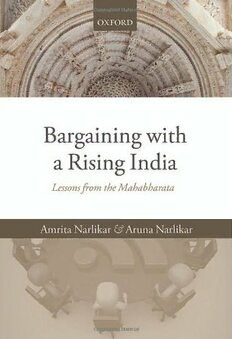Table Of ContentBARGAINING WITH A RISING INDIA
Bargaining with
a Rising India
Lessons from the Mahabharata
BY
AMRITA NARLIKAR
ARUNA NARLIKAR
1
3
GreatClarendonStreet,Oxford,OX26DP,
UnitedKingdom
OxfordUniversityPressisadepartmentoftheUniversityofOxford.
ItfurtherstheUniversity’sobjectiveofexcellenceinresearch,scholarship,
andeducationbypublishingworldwide.Oxfordisaregisteredtrademarkof
OxfordUniversityPressintheUKandincertainothercountries
#AmritaNarlikarandArunaNarlikar2014
Themoralrightsoftheauthorshavebeenasserted
FirstEditionpublishedin2014
Impression:1
Allrightsreserved.Nopartofthispublicationmaybereproduced,storedin
aretrievalsystem,ortransmitted,inanyformorbyanymeans,withoutthe
priorpermissioninwritingofOxfordUniversityPress,orasexpresslypermitted
bylaw,bylicenceorundertermsagreedwiththeappropriatereprographics
rightsorganization.Enquiriesconcerningreproductionoutsidethescopeofthe
aboveshouldbesenttotheRightsDepartment,OxfordUniversityPress,atthe
addressabove
Youmustnotcirculatethisworkinanyotherform
andyoumustimposethissameconditiononanyacquirer
PublishedintheUnitedStatesofAmericabyOxfordUniversityPress
198MadisonAvenue,NewYork,NY10016,UnitedStatesofAmerica
BritishLibraryCataloguinginPublicationData
Dataavailable
LibraryofCongressControlNumber:2013957002
ISBN 978–0–19–969838–7
PrintedinGreatBritainby
ClaysLtd,StIvesplc
To
Durga and Mahadeva
in respectful gratitude
Acknowledgements
Workingonthisbookhasbeenextremelyenrichingforus,intellectuallyand
emotionally. To bring together our expertise in modern International Rela-
tionsandclassicalSanskritsourceswasintellectuallyadelightfullystimulating
task. Emotionallytoo, thisbook holdsaspecial valueforusbecausemany of
the stories that we discuss here are amongst the most loved stories of our
childhoods.
Aruna began her intellectual journey into the Mahabharata with her
mother, Dr Vanamala Bhawalkar, who was a scholar of Sanskrit and a
publishedauthoronmanysubjects,includingtheMahabharata.Sheisgrateful
to both her parents, Vanamala and Professor D. R. Bhawalkar for the many
spiritedconversationsonIndianphilosophy,andalivelyintellectualenviron-
mentathome.
Amrita thanks many of her colleagues for useful conversations on this
exciting and unusual project. She is particularly grateful to Martin Daunton,
RosemaryFoot,AndrewHurrell,CharlesJones,MilesKahler,DonnaLee,and
Brendan Simms for stimulating questions and valuable suggestions. She
thanks the Master, Fellows, and staff of Darwin College for providing such a
happy and supportive environment to work in, and is especially grateful to
Geoffrey Lloyd,Leo Howe,and AlanBlackwellformanyhelpful discussions.
JagdishBhagwati,WillyBrown,DesmondKing,andRobertSternhavealways
beenasource ofinspiration, encouragement,andsupport.Sheisindebtedto
Markus Gehring, Adrian Kent, and Jocelyn Probert for their unwavering
friendship.
WearebothgratefultoOxfordUniversityPressfortheopportunitytowork
on this project, and especially to Dominic Byatt for his enthusiastic support
andconstructivesuggestionsthroughout.Wealsothanktheproductionteam
at OUP, particularly Carla Hodge and Elizabeth Suffling, for their splendid
cooperation.
We owe our greatest debt to Professor Anant Narlikar. His active involve-
ment significantly improved the project. His staunch support and spirited
encouragement kept us going. And his wonderful and unique storytelling
skillsmadeworkingonthisprojectallthemoreenjoyable.
Contents
1. PlayingHardball?IndiainInternationalNegotiations 1
2. India’sNegotiationStrategy:TheHeroismofHardBargaining? 24
3. FramingfromaMoralHighHorse 72
4. Coalitions:ChoosingAllies,SustainingFriendships 113
5. Time:TheLongShadowofthePastandtheFuture 167
6. Conclusion 206
AppendixA: TheStoryoftheMahabharatainBrief 225
AppendixB: ANoteofExplanationabouttheSanskritReferences 228
Index 231
1
Playing Hardball?
India in International Negotiations
Effective bargaining holds the key to dealing successfully with any rising
power. Politicianswhoseekalliances,businessentrepreneurswhoseekmar-
ket access, or indeed international bureaucrats who wish to secure greater
cooperationoninternationalagreementsmustengagethenewpowerthrough
persuasive negotiation. While the diplomatic cultures and styles of most
cultures show some national peculiarities,1 the new powers of today pres-
ent additional challenges. The so-called BRICs2—Brazil, Russia, India, and
China—have fundamentally different political structures from the core, and
theirvisionsofglobalorderhavepresentedachallengetothoseespousedby
the liberal West.3 Understanding the roots of their negotiating cultures
presents the first step towards bargaining successfully with them. This book
deals with the ‘I’ in the BRICs, namely India, and focuses particularly on
analysingIndia’snegotiatingtraditionsthroughthelensofaclassicalSanskrit
text,theMahabharata.
Why does India’s negotiation behaviour need explaining? To begin with,
IndiahasneverbeenaneasynegotiatingpartnerfortheWest.StephenCohen,
forinstance,writesthatIndia‘seemstorelishgettingtono’;further,theWest
has long been ‘irritated’ and ‘frustrated’ by India’s negotiation style.4 Experi-
mental studies further confirm that Indians are tough negotiators, showing
reluctance to compromise along with a readiness to reject offers.5 There are
many plausible explanations as to why India has proved to be a difficult
negotiating partner, including its relatively recent colonial past, particular
configurations of domestic interests, and bureaucratic politics in domestic
institutions. But a few studies argue that consistencies across issue areas
and continuities over time in India’s negotiation behaviour suggest that this
1 Druckmanetal.1976;R.Cohen2004;Salacuse2004. 2 O’Neill2001.
3 Hurrell2006;Narlikar2010. 4 S.Cohen2001. 5 Druckmanetal.1976.

